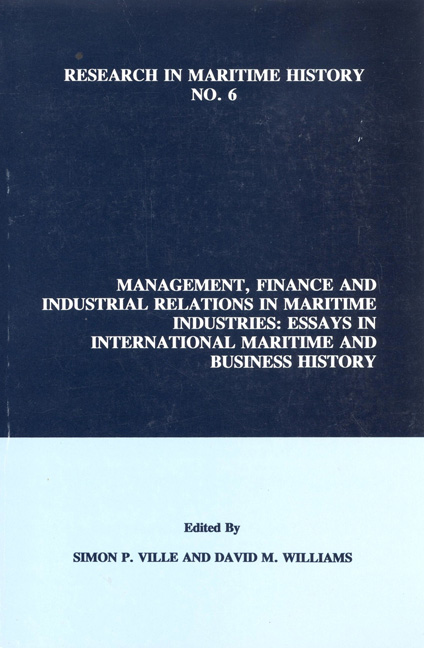 Management, Finance and Industrial Relations in Maritime Industries
Management, Finance and Industrial Relations in Maritime Industries Book contents
- Frontmatter
- Contents
- Contributors
- Introduction
- Contributors
- “Economic Theory, Information and Management in Shipbroking: Fearnley and Eger as a Case Study, 1869-1972”
- “The Early Nineteenth-Century Port of London: Management and Labour in Three Dock Companies, 1800-1825”
- “Owners and Masters: Management and Managerial Skills in the Finnish Ocean-Going Merchant Fleet, c. 1840-1880”
- “Management, Profitability and Finance in Twentieth-Century Spanish Merchant Shipping: The Compañía Maritima Del Nervion as a Case Study, 1899-1986”
- “Twentieth-Century Shipping Strategies: Broström and Transatlantic, Gothenburg's Leading Shipping Companies”
- “Contractors' Bounties or Due Consideration?: Evidence on the Commercial Nature of The Royal Mail Steam Packet Company's Mail Contracts, 1842-1905”
- “Patterns of Ownership and Finance in the Greek Deep-Sea Steamship Fleet, 1880-1914”
- “Financial Weakness and Industrial Conflict in Italian Shipbuilding Between the Two World Wars”
- “Responding to the Global Market in Boom and Recession: Japanese Shipping and Shipbuilding Industries, 1945- 1980
“Economic Theory, Information and Management in Shipbroking: Fearnley and Eger as a Case Study, 1869-1972”
from Contributors
- Frontmatter
- Contents
- Contributors
- Introduction
- Contributors
- “Economic Theory, Information and Management in Shipbroking: Fearnley and Eger as a Case Study, 1869-1972”
- “The Early Nineteenth-Century Port of London: Management and Labour in Three Dock Companies, 1800-1825”
- “Owners and Masters: Management and Managerial Skills in the Finnish Ocean-Going Merchant Fleet, c. 1840-1880”
- “Management, Profitability and Finance in Twentieth-Century Spanish Merchant Shipping: The Compañía Maritima Del Nervion as a Case Study, 1899-1986”
- “Twentieth-Century Shipping Strategies: Broström and Transatlantic, Gothenburg's Leading Shipping Companies”
- “Contractors' Bounties or Due Consideration?: Evidence on the Commercial Nature of The Royal Mail Steam Packet Company's Mail Contracts, 1842-1905”
- “Patterns of Ownership and Finance in the Greek Deep-Sea Steamship Fleet, 1880-1914”
- “Financial Weakness and Industrial Conflict in Italian Shipbuilding Between the Two World Wars”
- “Responding to the Global Market in Boom and Recession: Japanese Shipping and Shipbuilding Industries, 1945- 1980
Summary
Introduction: Information, Management and Economic Theory
Economic theory until recently has had relatively little to offer business historians interested in decision-making within a particular enterprise. The central dilemma was in effect a lack of congruence between theory and reality. In particular, two assumptions shared to varying degrees by both classical and neo-classical economists ran counter to what many scholars encountered when examining intra-firm behaviour. The first - an insistence upon the concept of perfect competition (or, in another guise, the “perfect market“) - has always constrained the utility of economic models for business historians confronted with monopsonies, monopolies or other forms of imperfect markets. According to traditional theory, such conditions could only be transitory, since inflated returns would eventually induce new entrants, thereby restoring competition. Yet even ignoring the vexing problem of defining “transitory” (or its oftused synonym, “short-term“), the difficulty is that there are many historical cases of companies with sufficiently substantial market shares to enable them to be consistent price makers rather than price takers. Moreover, some enterprises have been able to defy the model's predictions for much longer than even the most generous construction of “transitory” would permit. Fortunately, the theory of agency and the concept of transaction costs have enabled economic theorists to design models which have largely overcome this difficulty.
But the second assumption has in many ways been more difficult to rationalize. This is the idea that individuals or firms always make decisions based upon perfect knowledge. That this is unlikely to be true is suggested by common sense and practical experience. Since even the most learned economist would be hard-pressed to describe a transaction in which all actors were guided by anything approaching “perfect knowledge,” how reasonable is it to incorporate such a concept into economic models? Economists concerned with this conundrum eventually turned to the theory of uncertainty. While this helped to a certain extent, it did not entirely solve the problem for two reasons. First, the so-called “Arrow-Debreu theory” which lay at the heart of this approach was highly mathematical and as such unlikely to meet the needs of most business historians. Perhaps more important, the model was not originally designed as a way of simulating equilibrium under conditions of uncertainty; the elaboration which enabled it to be so used has struck many scholars as only marginally satisfactory.
- Type
- Chapter
- Information
- Management, Finance and Industrial Relations in Maritime IndustriesEssays in International Maritime and Business History, pp. 1 - 30Publisher: Liverpool University PressPrint publication year: 1994


